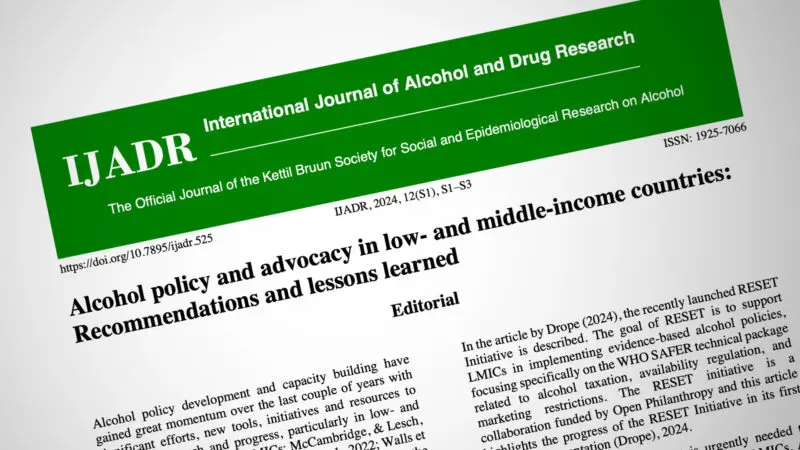The Covid-19 pandemic shows us why the Norwegian Government Pension Fund Global (the oil fund) must stop investing in alcohol. In South Africa the strict alcohol regulations during the pandemic have led to startling results.
South Africa has a major alcohol problem where binge drinking leads to major health problems, acute injuries, drunk-driving, and cases of violence, especially violence against women. The problem is exacerbated by a powerful alcohol industry and few regulations on sale and serving of alcohol. In addition, South Africa is now in the middle of one of the largest outbreaks of Covid-19 in the world. The country’s hospital beds and emergency services must be used to treat Covid patients, not patients with alcohol-related injuries.
In this scenario, the Government Pension Fund Global (the Norwegian oil fund) plays a role through its investments in international alcohol companies operating in South Africa. FORUT believes it is unethical to invest in a product that, in South Africa and in other countries, occupies hospital beds and contributes to violence and insecurity.
Must seize the opportunity
South African authorities took action early in the pandemic to free up capacity in their hospitals by temporarily banning the sale and serving of alcohol. This has been implemented in two periods after mid-March, and it has given good results. For example, the number of acute alcohol-related injuries went significantly down, with a documented decrease in hospital admissions of up to 60 per cent. When alcohol sales were temporarily reopened in July, the number of traffic deaths on a national basis doubled, and the number of emergency admissions increased again. In the province of Western Cape, the number of admissions increased by as much as 350 percent.
South Africa has only to a small extent implemented effective measures to reduce alcohol-related harm. This is why civil society organizations and researchers are now arguing for effective policies that are in line with both the World Health Organization’s (WHO) recommendations and evidence from the field. Civil society and researchers argue for «a new normal» in South Africa, with, among other things, reduced availability to alcohol and restrictions on alcohol advertising. They fear that the country will return to «the old normal», i.e. to the way it was before the pandemic in terms of poor alcohol control measures. This will, they claim, lead to Africa’s highest alcohol consumption and extensive negative consequences.
A campaign has been launched by civil society actors, among them
to show the positive results of less available alcohol in connection with covid-19. A powerful film (below) is the core of the campaign. The campaign is made to influence politicians, professionals, and public opinion in South Africa to support effective measures to reduce the negative aspects of alcohol use.
New examples of well-known connection
The fact that alcohol use has negative consequences is well known and well documented in research. In South Africa, however, the Covid-19 pandemic has provided unique access to concrete examples and statistics on the consequences for the nation, specifically its health care and emergency services, of high alcohol consumption with few control policies in place. Nevertheless, the alcohol industry in South Africa has fought the implementation of more control policies during the pandemic. In the same way they have argued against the implementation of effective alcohol policy instruments in the country for a number of years. Among other things, a bill on advertising restrictions has been drafted, but it has never been discussed in parliament.
In their argumentation for the lifting of the ban, the alcohol companies have emphasized lost income for alcohol producers and restaurants, but also for the authorities in the form of taxes. In addition, they point to job losses and South Africa’s relations with trading partners in the EU, which are now unable to sell alcohol to one of their most important markets in Africa. The industry has argued strongly to bring the country back to the situation before the pandemic with few regulations on alcohol sales and consumption.
We all see that stronger regulation of alcohol sales can have financial consequences for those who make money from alcohol, and no one is arguing for a permanent ban on alcohol, neither here in Norway nor in South Africa. But public health must take precedence over profit. Policies that put public health before profit will also save large public spendings, for example on health services. This is a clear priority in Norwegian alcohol policy, and should be in South Africa as well. Not least, it should be reflected in investments we make with our own pension assets. This is not the case today.
Must stop investing in alcohol
In 2019, the oil fund invested approximately 116 billion NOK in alcohol companies worldwide. At least 109 of these billions were invested in companies that also operate in South Africa. Many of them have worked actively to lift the ban during the pandemic. They have also been fighting against the introduction of alcohol policy instruments for many years. These are measures that could free up hospital beds and save many people from accidents, violence and poor health.
In other words: Norwegian oil money is helping to exacerbate a serious and extensive public health problem, both in South Africa and in the rest of the world. In other words: Investments that will secure our own future help to destroy the future of others. It clearly is a paradox that the Norwegian pension fund is investing in a product that is harmful to many and particularly vulnerable groups, and in an industry that works to prevent the countries in which they operate from introducing effective alcohol policy instruments. Both we at FORUT and our partner organisations in southern Africa believe that we cannot live with this obvious paradox.
The paradox is further reinforced by the fact that the instruments the alcohol industry is working so hard to stop are instruments that have helped to keep consumption and harm levels down in our own country. They are also recommended by both the WHO and a unified research community.






